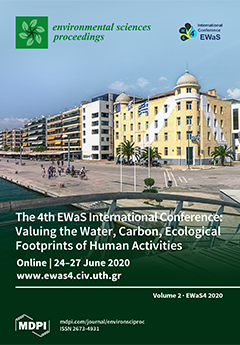Catalytic ozonation is an Advanced Oxidation Process (AOPs) based on the production of hydroxyl radicals, which are very reactive oxidative species. The aim of this study is to evaluate the catalytic activity of calcite on the ozonation of four different typical micropollutants (atrazine,
[...] Read more.
Catalytic ozonation is an Advanced Oxidation Process (AOPs) based on the production of hydroxyl radicals, which are very reactive oxidative species. The aim of this study is to evaluate the catalytic activity of calcite on the ozonation of four different typical micropollutants (atrazine, benzotriazole, carbamazepine, and p-CBA) at pH 7 and for low initial concentrations (4 μΜ) by performing batch mode experiments. These compounds have different physico-chemical characteristics, as well as different rate constants, when reacting with ozone and hydroxyl radicals (•OH), being in the range of <0.15 − 3 × 10
5 M
−1s
−1 and 2.4 − 8.8 × 109 M
−1s
−1, respectively. It was found that most of these micropollutants can be sufficiently removed by the application of heterogeneous catalytic ozonation, using calcite as the catalyst, except for the case of atrazine, which was the compound that was most difficult to degrade, when compared to the application of single ozonation. Carbamazepine with k
O3 = 3 × 10
5 M
−1s
−1 can be easily removed even by single ozonation after the first minute of the reaction time, and the addition of the catalyst eliminated the oxidation/reaction time. The application of catalytic ozonation resulted in 50% and 68.2% higher removals of benzotriazole and p-CBA, respectively, in comparison with single ozonation, even during the first 3 min of the reaction/oxidation time, due to the higher production of hydroxyl radicals, caused by the catalytic ozonation. For the case of atrazine, the addition of calcite did not enhance the micropollutant degradation, and its removal reached 83% after a 30 min application of catalytic ozonation, whereas during the single ozonation, the removal under the same reaction time was 90%.
Full article



